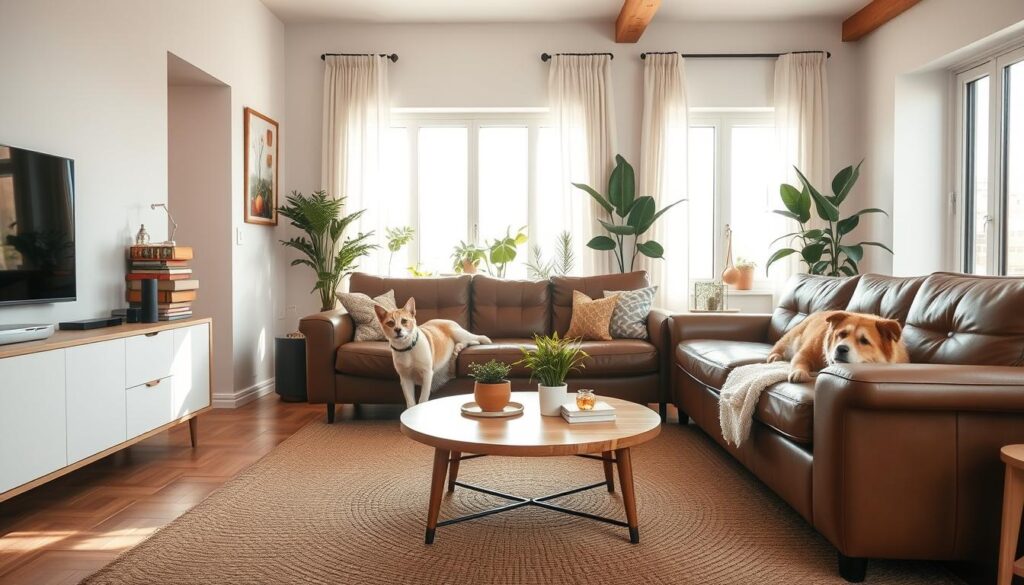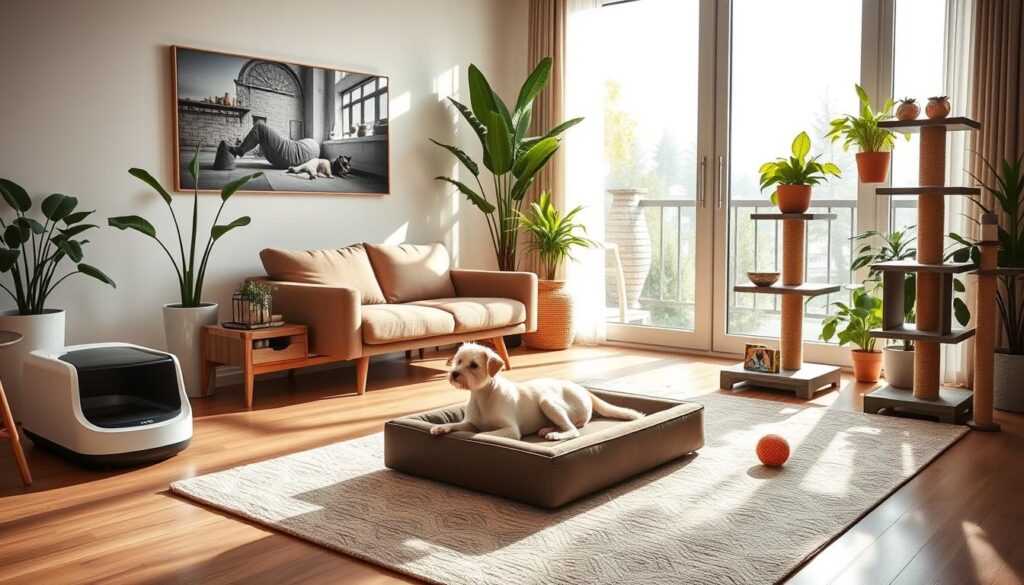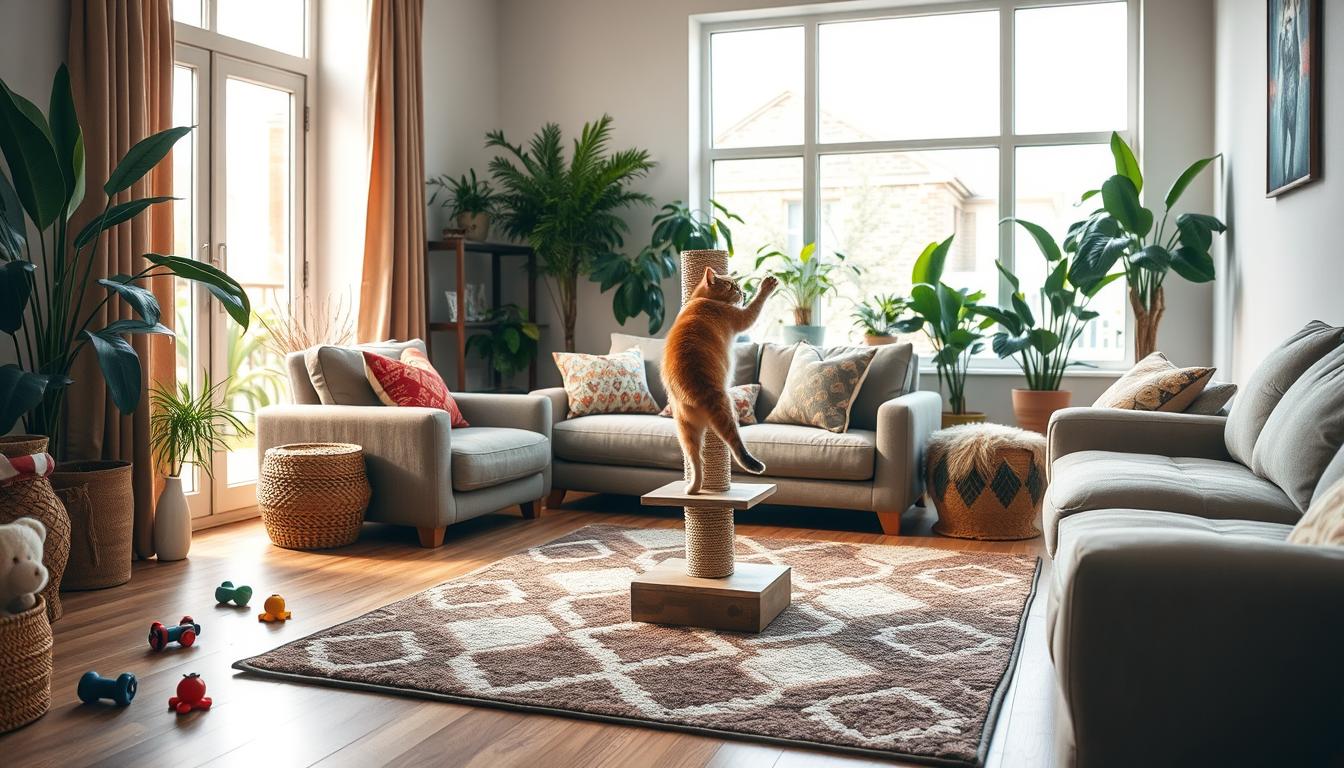Did you know that nearly 67% of American households own a pet, according to the American Pet Products Association? With so many of us sharing our homes with furry, feathered, or scaly companions, it’s crucial to create a living space that caters to their needs while maintaining our own comfort and style. A pet-friendly home design is not just a trend — it’s a necessity for millions of families.
Creating a pet-friendly environment balances the aesthetics and functionality of our homes with the well-being and safety of our beloved pets. From the right flooring choices to designated cozy corners and safe outdoor areas, there are multiple ways to ensure both you and your pet can live happily together. In this guide, we will explore smart strategies and expert tips to make your home more accommodating for your pets.
Key Takeaways
- 67% of American households own a pet, highlighting the need for pet-friendly home design.
- Pet-friendly environment strikes a balance between pet needs and home aesthetics.
- Smart strategies include choosing the right flooring and creating safe, cozy spaces.
- Design tips also cover maintaining cleanliness and ensuring pet safety both indoors and outdoors.
- Ensuring a comfortable and functional living space for pets and owners alike is essential.
Choose Pet-Friendly Flooring Options
When creating a pet-friendly home, selecting the right flooring is crucial. Different materials offer varied levels of durability, ease of cleaning, and resistance to pet-related damage. Below, we will compare some of the most popular flooring options you can consider for your home.
Pros and Cons of Popular Flooring Materials
Choosing the best pet-friendly flooring involves weighing the pros and cons of each type:
| Flooring Type | Pros | Cons |
|---|---|---|
| Hardwood |
|
|
| Laminate |
|
|
| Tile |
|
|
| Carpet |
|
|
Tips for Maintaining Clean Floors
Keeping pet-friendly flooring clean and in good condition requires some specific care strategies. Here are several tips for preventing pet damage and maintaining hygiene:
- Utilize pet-proof rugs: Place washable area rugs or mats in high-traffic spots to capture dirt and prevent scratches.
- Regular grooming: Keep your pet’s nails trimmed to minimize the risk of scratches on your flooring.
- Effective cleaning agents: Use cleaning products that are safe for pets to maintain cleanliness without risking their health. Consider enzyme-based cleaners for tackling pet stains and odors effectively.
- Strategic placement of doormats: Place absorbent mats at entrances to reduce the amount of dirt and moisture your pet brings inside.
Create Safe Spaces for Your Pets
Creating designated safe spaces in your home for your pets is a crucial part of pet-proofing home. These spaces provide a sense of security and comfort for your furry friends and prevent them from accessing potentially hazardous areas. Here are some vital pet safety tips to help you get started.
Designing a Cozy Corner
A cozy corner can be created using pet beds, strategically placed cushions, and blankets. Always choose materials that are easy to clean and resistant to shedding. These dedicated areas allow pets to relax without invading other parts of the house. Integrating these spaces into your living room or bedroom ensures pets remain close, fostering a sense of belonging.
Pet-Friendly Furniture Choices
When selecting furniture, opt for pet-friendly materials such as leather or microfiber, which are easy to clean and durable. Avoid delicate fabrics that are easily damaged by claws and teeth. Furniture covers and pet-specific throws can further protect your investment while keeping your spaces clean and comfortable for your pets.
Use of Baby Gates
Baby gates are excellent tools for pet-proofing home as they help establish boundaries. They can prevent pets from accessing rooms that contain hazardous items like cleaning supplies or delicate décor. By using baby gates effectively, you can keep your pets safe and contained, giving you peace of mind.
Organize and Store Pet Supplies Efficiently
When it comes to creating a pet-friendly home organization, having an efficient system for storing your pet’s supplies can make all the difference. Proper storage not only keeps your space tidy but also ensures that essential items are accessible when you need them most.
Best Storage Solutions for Toys and Supplies
An effective way to manage pet supplies is by using dedicated storage solutions. Consider using:
- Bins and Baskets: Choose durable, easy-to-clean bins and baskets for storing toys, grooming tools, and pet food.
- Shelves: Install shelves to keep items out of reach of pets but within easy access for you.
- Cabinets: Use cabinets with safety locks to store potentially harmful items like medications or cleaning supplies.
Labeling and Keeping Items Accessible
Labeling your storage solutions ensures that everyone in your household knows where to find and return pet items. Clearly marked labels can help prevent mix-ups and streamline your daily pet care routine.
Another effective tactic for pet-friendly home organization is to keep regularly used items, like leashes and treats, in easily accessible locations. Wall hooks or small caddies by the door can make a big difference:
- Wall Hooks: Keep leashes and collars handy but off the floor.
- Small Caddies: Place these by the door for quick access to treats and waste bags.
Implementing these storage strategies will not only enhance your pet-friendly home organization but also make daily routines smoother and safer for your furry friends.
Select Non-Toxic Plants for Your Home
When curating a pet-friendly garden, selecting non-toxic plants for pets is crucial. Many common houseplants can be hazardous if ingested by your furry friends. Here, we provide a guide to some of the best pet-safe indoor plants to ensure that your home remains a safe sanctuary for your pets while still enjoying the beauty of greenery.
List of Pet-Safe Indoor Plants
Having a lush and vibrant interior doesn’t have to come at the cost of your pet’s health. Here are some beautiful and non-toxic plants for pets:
- Spider Plant – Known for its air-purifying qualities.
- Areca Palm – Adds a tropical touch without the risk.
- Basil and Thyme – Not only pet-safe but also useful in the kitchen.
- Boston Fern – Perfect for hanging baskets and completely harmless to pets.
- African Violet – A vibrant option that’s safe and easy to care for.
Tips for Maintaining a Pet-Friendly Garden
Creating a safe outdoor space for your pets is just as important as indoor plant choices. Here are some tips for pet-friendly gardening:
- Choose Non-Toxic Plants: Always research before planting to ensure no harmful species are included.
- Avoid Harmful Pesticides: Opt for organic or natural pest control methods to keep your pets safe.
- Elevate Plants: Place pots and plant beds out of reach, especially if your pet likes to chew on foliage.
- Create Barriers: Use fencing or other barriers to keep curious pets away from certain areas.
| Plant | Benefits | Care Tips |
|---|---|---|
| Spider Plant | Air Purifying | Low Light, Water Weekly |
| Areca Palm | Tropical Aesthetic | Bright Indirect Light, Moist Soil |
| Boston Fern | Hanging Decor | High Humidity, Keep Soil Damp |
| African Violet | Vibrant Blooms | Moderate Light, Water from Bottom |
Create Outdoor Spaces for Play and Relaxation
Designing outdoor areas that balance fun and safety is paramount for pet owners. To ensure a holistic approach, focus on creating *secure outdoor areas for pets* and incorporate elements that cater to their well-being.
Fencing Options to Keep Pets Safe
Choosing the right fencing is crucial for creating *secure outdoor areas for pets*. High-quality materials and robust construction can prevent escapes and protect from external dangers. Here are some popular options:
- Wooden Fences: Durable and sturdy, offering privacy and security.
- Metal Fences: Long-lasting and difficult for pets to climb or chew through.
- Invisible Fences: Effective for training and maintaining boundaries without obstructing views.
Design Ideas for a Pet-Friendly Yard
Implementing creative *pet-friendly landscaping* ideas can make your yard a haven for pets. Consider incorporating these features to enhance their outdoor experience:
- Shade Areas: Install canopies or plant trees to provide cool spots during hot days.
- Water Features: Incorporate ponds or pet-specific hydration stations to keep pets hydrated and entertained.
- Non-Toxic Plants: Choose flora safe for pets to ensure they can explore without risk.
By thoughtfully combining these elements, you can transform your yard into an ideal *pet-friendly landscaping* area where pets can play and relax safely.
Invest in Durable and Easy-to-Clean Furniture
When it comes to picking the right pet-friendly furniture, durability and ease of cleaning are paramount. Pets can be tough on furnishings, so choosing materials that resist pet hair, scratches, and stains will save you time and money in the long run.
Recommended Furniture Materials
Several materials stand out as excellent choices for pet-friendly furniture:
- Leather: It’s easy to clean and doesn’t hold onto pet hair. Though it can scratch, it ages gracefully.
- Microfiber: Known for its tight weave, microfiber resists pet claws and is simple to clean with soap and water.
- Outdoor Fabric: Many pet owners are turning to outdoor fabrics for their indoor furniture. These fabrics are designed to resist stains, moisture, and even UV rays.

Care Tips to Extend Furniture Life
Maintaining your pet-friendly furniture involves a few key practices:
- Regular Cleaning: Establish a routine to remove pet hair and dirt. Vacuuming and using lint rollers can be very effective.
- Pet Odor Removal: Use pet-specific odor removers to keep your furniture smelling fresh. Refrain from using harsh chemicals that may damage fabric or harm pets.
- Protective Covers: Consider using slipcovers or blankets to protect your furniture from wear and tear. These can be easily removed and cleaned.
Implement Smart Storage for Pet Gear
When it comes to pet gear organization, having the right storage solutions can transform your home. A balance of aesthetics and functionality ensures that your space remains clutter-free while complementing your decor. Here are some valuable tips to achieve stylish pet storage solutions effectively.
Stylish Baskets and Bins for Supplies
Incorporating stylish pet storage solutions like chic baskets and bins can add a touch of elegance to your home. Opt for woven baskets or designer fabric bins that integrate seamlessly with your interior. These containers can hold toys, grooming tools, and other essentials, keeping them within easy reach and organized. Consider color-coordinated options or those with patterns that match your existing decor.
Keeping Leashes, Collars, and Toys Organized
For effective pet gear organization, designate specific areas for leashes, collars, and toys. Utilize hooks or a wall-mounted rack near the entryway to hang leashes and collars, making them easily accessible for walks. Drawer organizers can also be used within a console table to keep these items tidily stored. For toys, a dedicated basket in the living room ensures your pet’s playthings are always available without creating a mess.
| Storage Item | Best For | Why It’s Effective |
|---|---|---|
| Woven Baskets | Toys, Grooming Tools | Durable and stylish, fits into any decor |
| Fabric Bins | Various Supplies | Lightweight, easily moveable |
| Wall-Mounted Rack | Leashes, Collars | Keeps items off the floor and organized |
| Drawer Organizers | Small Accessories | Makes the most of drawer space |
Establish a Pet Routine for Home Areas
Creating a structured environment for your pets not only ensures their happiness but also contributes to a harmonious household. Incorporating pet routine management alongside designated areas can make a significant difference.
Benefits of Designated Pet Zones
Setting up designated pet zones helps in establishing clear boundaries within your home. This can aid in training, reduce unwanted behaviors, and make your pet feel more secure. A well-defined area for feeding, sleeping, and play creates a predictable environment, fostering a sense of routine and order.
Incorporating Pets into Daily Activities
Engaging your pets in everyday activities is a great way to strengthen your bond. Pets thrive on consistency, so integrating them into your daily life with scheduled mealtimes, play sessions, and training periods is key to effective pet routine management. Such routines ensure that pets receive the attention and care they need, leading to a happier and well-adjusted pet.
Incorporate Pet-Friendly Technology
Integrating pet-friendly technology into your home can significantly enhance the well-being of your furry friends. From monitoring devices to automated feeders, these technologies offer smart solutions for pet care and safety.

Smart Devices to Monitor Pets
Keep an eye on your pets even when you’re away with advanced pet monitoring devices. Smart cameras like those offered by Furbo and Petcube allow you to check in on your pets in real time. Some even come with treat dispensers and interactive features that enable you to engage and play with your pets remotely.
- Furbo Dog Camera: Includes a treat-tossing function to reward your pet.
- Petcube Play 2: Features a laser toy for interactive play.
- Whistle FIT: Tracks your pet’s health and activity levels.
Automatic Feeders and Water Dispensers
Ensuring your pet has access to food and water at regular intervals is crucial. Automatic feeders and water dispensers can help manage this by dispensing portions according to scheduled times.
| Device | Feature | Benefits |
|---|---|---|
| PetSafe Smart Feeder | Programmable feeding schedules | Ensures timely meals; controls portion sizes |
| Catit Senses Fountain | Continuous water flow | Promotes hydration; reduces water stagnation |
| WOPET Smart Feeder | Wi-Fi enabled | Allows remote feeding; connects to your smartphone |
These pet-friendly technologies not only make it easier to care for your pets but also provide peace of mind, knowing they’re well-tended even in your absence. Investing in pet monitoring devices and automatic feeders can revolutionize your approach to pet care, making it more efficient and thoughtful.
Focus on Pet Safety Throughout Your Home
Creating a pet-friendly home doesn’t stop at comfort and convenience; ensuring your pets’ safety is equally crucial. Pet-proofing safety measures can help you avoid potential hazards and keep your furry friends secure. Everyday safety protocols, such as securing cabinets and using childproof latches, can go a long way in preventing accidents.
Best Practices for Keeping Pets Secure
For pet-proofing safety measures, consider using baby gates to restrict access to specific areas. Ensure that electrical cords are out of reach or covered to prevent chewing. Toxic household items like cleaning products should be stored in secured cabinets. Outfitting your home with pet-friendly technology, such as motion sensors that alert you to unusual activities, can further enhance your pets’ safety.
Emergency Prep Tips for Pet Owners
Emergency preparedness for pets is a vital aspect of pet care. Have an emergency kit ready, complete with food, water, medications, and important documents. Develop an evacuation plan that includes your pets, and ensure each one has up-to-date ID tags and microchips to help identify them if they get lost. Knowing the nearest pet-friendly shelters and having a list of emergency contacts can be lifesaving in urgent situations.
The overall goal is to create a secure and prepared environment where your pets can thrive, giving you peace of mind and creating a safe haven for your beloved companions.


